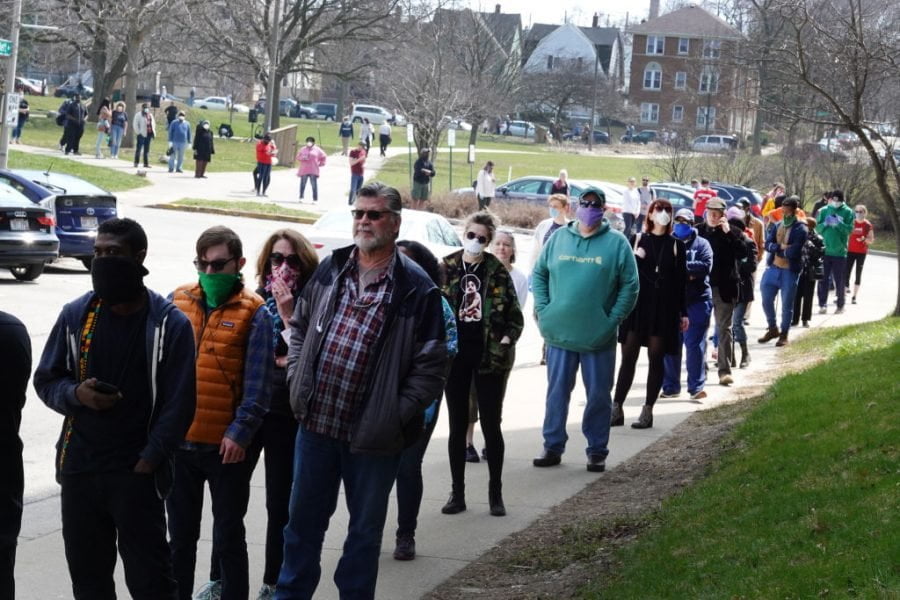From Jacobin
At the beginning of the early voting period, some voters in Cobb County, Georgia, waited more than six hours to cast a ballot. Elsewhere in Atlanta, the delay was over ten hours. In New York City, it took four hours for some voters to get into the polling booth.
Apart from a ballot drop box, the defining image of the past few weeks has been Americans lining up to vote — the lines often snaking endlessly into the distance, made more pronounced by social distancing requirements. According to the United States Elections Project, some 100 million votes were cast before Election Day. Some states even surpassed their overall 2016 turnout during the early voting period.
This massive display of voter turnout, particularly amid suppression efforts, is remarkable. But we shouldn’t lose sight of the fact that long lines are neither inevitable nor a sign of a fully functional democracy. Even in a pandemic — or, perhaps, especially in a pandemic — no voter should be forced to wait more than an hour to cast a ballot or worry that their mailed ballot will not be delivered on time.
As University of Kentucky law professor Joshua A. Douglas told me via text message: “It’s great to see strong voter engagement. But don’t mistake record turnout with the lack of voter suppression. Voters are jumping through unnecessary hoops to exercise their fundamental right to vote.”
There are many reasons for long lines, which disproportionately affect communities of color. Not all of the reasons are malicious. A lack of funding, the closing of polling places, misplaced expectations about turnout, malfunctioning machines, and administrative errors can all contribute to wait times. But intent doesn’t change the reality that long lines are a poll tax. And the longer the wait time, the less accessible our democracy is to working-class people. (Fortunately, it appears that there are fewer instances of long voting lines today — likely because so many people have already voted.)
Simply put, the fact that countless voters were willing to spend hours in line does not make it any less absurd that they had to do so. Nor does the possible circumvention of explicit voter suppression measures (of which there are too many to name here) make them any less despicable and deleterious.

Regardless of today’s election results, we have a choice: do we overhaul our undemocratic political system to end its inequalities and suppression, or do we merely hope its antiquated, rickety structure can withstand further onslaught from those who would like to see it crumble?
There are some immediate steps we can take to bring our electoral democracy up to an at least functional level. We can pass automatic and same-day voter registration for all federal elections. We can standardize and expand voting by mail and mandate early voting in all states. We can ban felon disenfranchisement, discriminatory voter ID laws, and aggressive voter purges, and we can limit long lines by fully funding localities, preventing unnecessary poll closures, improving language assistance, and ensuring all election machines are up-to-date and fully functional.
On this last point, the Brennan Center for Justice explains:
allocating equal resources among counties and precincts is not sufficient to produce equal wait times for voters, particularly those of color and of lower incomes. Instead, election administrators must target those counties and precincts with a history of long wait times and allocate enough resources to these locations to equalize the wait times for all voters.
Beyond voting, independent redistricting commissions can put a stop to gerrymandering and minoritarian rule. Public financing of elections — such as the democracy vouchers proposed by Bernie Sanders in the presidential primary — could radically empower a new working-class political donor base.
Democratic leaders have said their first priority in 2021 is passing omnibus democracy reform, likely similar to what the House approved in the beginning of 2019. That would be a great start, as would revitalizing the Voting Rights Act and granting statehood to Washington, DC. But we’ll need much more to truly make the US political system reflect the popular will. We must push the boundaries of democracy reforms, including instating stronger federal oversight and regulations of elections, ranked-choice voting, multimember districts, subsidies for public interest lobbying, universal voter registration, and expanding the federal courts. More ambitiously, we could press for abolishing the Electoral College and amending the Constitution to explicitly guarantee the right to vote.
Long voting lines may not seem like a pressing problem, save for when you’re waylaid on Election Day. But it points to deeper ills with America’s political system, which is far more receptive to the oligarchic minority than the working-class majority. In order to win Medicare for All, a Green New Deal, a jobs guarantee, and other pro-worker policies, we’ll have to simultaneously push for a more democratic America. And for starters, that means no long voting lines.
Leave a Reply
You must be logged in to post a comment.